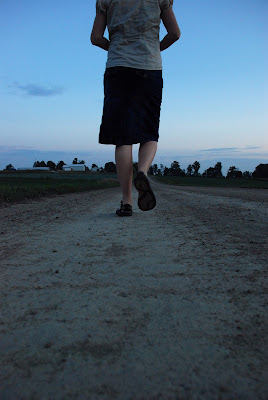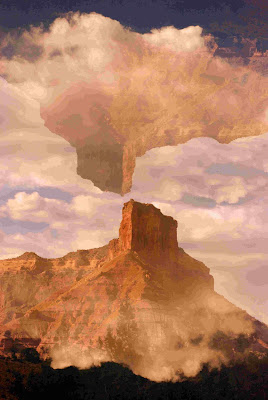David Bentley Hart published The Beauty of the Infinite: The Aesthetics of Christian Truth in 2003. Hart, an American Greek Orthodox himself [I suspect he is a convert], draws on the thought of Gregory of Nyssa, who was a contemporary of Augustine, the younger brother of Basil the Great, and a good friend of Gregory of Nazianzus. It seems that Gregory of Nyssa was (one of) the first theologian(s) to argue that God was infinite. Before this thinkers like Origen had argued, as consistent with Platonism, that God was limited. I suspect this has something to do with the "form" of the Good in the Platonic system. At any rate, Nyssa pushed towards negative theology, claiming that God was unknowable. The idea that is at the centre of Hart's text, which I suspect comes form Nyssa, is that God is an abyss in which beauty subsists. All the beautiful particulars of creation are not subsumed into unity with God, but given to the beauty of their very particularity in the infinite distance of God himself. For the first third of the book, Hart critiques the "postmodernists" - Derrida, Deleuze, Foucault, Levinas, Lyotard, Nancy, as well as their intellectual fathers, Heidegger and Nietzsche. Following in Milbank's footsteps, he argues that these thinkers theorize an ontology of violence, a Hobbsian war of all against all, which is based on the Cartesian separation of soul and body, God and creation - that leaves us with skepticism about reality - an inner violence of self consciousness. This is to say that the postmodernists, following Nietzsche, claim that the will to power precedes any peace. For Christians this in unacceptable as the peace of God, b(r)ought through the lamb of God, was spoken before time as the Word of God, and is the primary principle of creation. Any violence that ensues, ensues through deviance from the beautiful order of God in the Garden. We see the violence of lying and disobedience in Adam and Eve, which leads to the brother against brother violence, when Cain kills Abel. The chaos of the Cannanite myth of the Leviathan is placed after the order, peace, goodness and beauty of God's creation (Hart 257-8; this is the best Christian answer to Zizek's chaotic "night of the world" which is his primary principal of the imagination - The Ticklish Subject 29-32 and throughout).
The chaos of culture obscures the objectivity of beauty that was so central to Hellenistic and the Church Fathers. But Hart claims that beauty must not be relegated to a subjective effect, but exalted as an on objective presence (I'm lost for a word here, as Hart critique metaphysics heavily). However, he would be the first to claim that empirical methodologies will not be able to capture of isolate beauty as it is a transcendental, embodying divine distance, which always has a beyond, even while it is present. Like the transcendentals, Hart's thesis pervades his work and yet is not fully understable until you have read the whole.
Not being able to get into the myriad arguments that he puts forth, I will list off notable comments about the beautiful that he makes in the introduction, and which are elaborated throughout.
I should mention that Hart is in Balthasar's camp - arguing for beauty through the analogy of beauty. He critiques Barth quite heavily on this topic.
1. Beauty is objective: "in the beautiful God's glory is revealed as something communicable and intrinsically delightful, as including the creature in its ends, and as completely worthy of love...beauty calls not only for awe and penitence, but also for rejoicing" (17-8).
2. Beauty is the true form of distance: Hart has his eye on Derrida here, who claims that "meaning" [for lack of a better word] cannot traverse distance, and falls to differance. "This presence of distance within the beautiful, as primordially the effect of beauty, provides the essential logic of theological aesthetics: one that does not interpret all distance as an original absence, or as the difference of differentiation's heterogeneous and violent forces, but that sees in distance, and in all the series and intervals that dwell in it, the possibility of peaceful analogies and representations that neither falsify nor constrain the object of regard"(18). "The first thought ... is the thought of the distance that opens up all differences, the interval between their terms, the event of their emergence; and in asserting that distance is originally the gift of the beautiful - rather then the featureless sublimity of will, or force, or differance, or the ontological Nothing - theology interprets the nature and possibility of every interval within being" (19). Hart latter evokes Augustine's analogy of music to describe how created differences can be brought together beautifully and peacefully, under God's orchestration - perhaps the most important point of the book.
3. Beauty evokes desire. Contra Luther and Kierkegaard, who separate ethics and aesthetics, Hart sides with Dante and sees eros and agape united in desire of the particular.
4. Beauty crosses boundaries. Goodness, truth and beauty are convertable..."that God is good may be seen and tasted; and this means that a theology of beauty should not scruple to express itself at times as an ontology, an epistemology, or an ethics...theology should ponder how beauty can compel morally by its excess" (21).
5. Beauty's authority, within theology, guards against any tendency towards gnosticism. Beauty is the incarnate logos, Christ. He came as God and man, spirit and body, united. Creation is good.
6. Beauty resists reduction to the "symbolic". "beauty lies in the immediacy of a certain splendor, radiance, mystery, or allure; it plays upon the continuous insisture of a plastic, or lyric, or organic, or metaphoric surface" (24). He, here, is denying the bad symbolic of fixity (Lacan's law of the father)"the symbolic occurs as that which stabilizes the individual aesthetic moment as a fixed property, a meaning, a kind of exchangeable capital or currency that stands in lieu of substantial wealth" (25). This invites the Cartesian gnosticism, where real and symbolic are parsed from each other, causing the real or the meaning to be an abstracted extra, a supplementarity. For Hart, beauty is on the surface, not in the depths (gnostic truth). "But the beautiful is prior to all schemes of isolable meanings: it is excess but never formlessness, a spilling over, jubilant, proclaming glory without "explaining" it. For just this reason it fixes reflection upon the irreducibly particular, the momentary, fragile, and fortuitous. In the beautiful, when it is liberated from the "symbolic," a purely serial infinity is implied - such as Hegel dreaded - and the circular infinity of synthesis and transcendental reconciliation - such as Hegel heralded - is resisted"(25).
Hart concludes by arguing that beauty is in the particulars: "In the end, that within Christianity which draws persons to itself is a concrete and particular beauty, because a concrete and particular beauty is its deepest truth" (28). Here Hart is trying to side step the onto-theological critique of Heidegger and Derrida.
As you can see, Hart has given Christian thinkers much to mull over. I am not done with Hart. And I'm sure the exercise isn't in vain.




